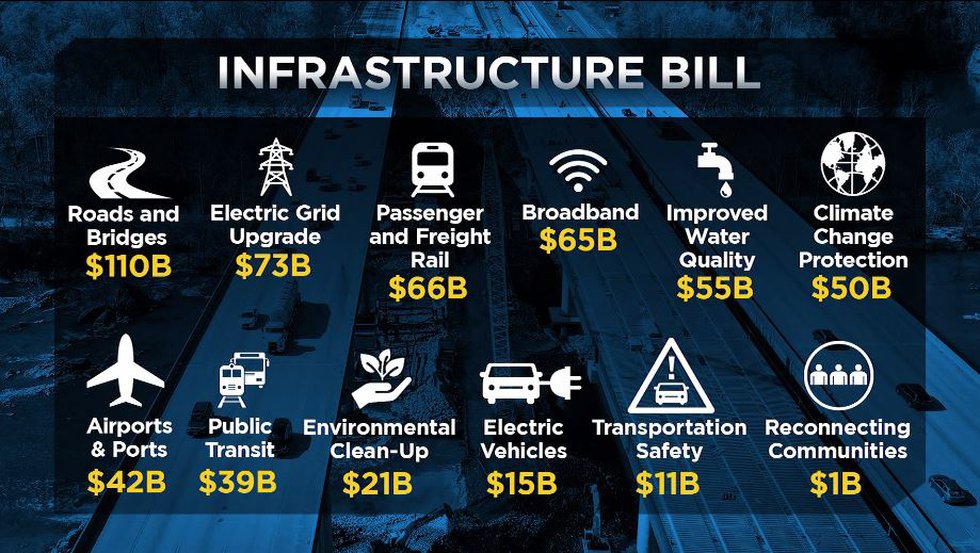The Infrastructure Bill: What It Includes and What Remains To Be Done
November 22, 2021 by
 On November 15th, President Biden signed the Infrastructure Investment and Jobs Act (IIJA). The bill represents the culmination of months of negotiations between House Democrats and Republicans as well as within the two parties. The goal of this US infrastructure bill is to significantly revitalize and modernize American infrastructure – the various systems, equipment, and structures that make modern life possible. Although significantly less than the original bill, the $1.2 trillion package represents one of the most significant investments by the federal government in infrastructure since the Great Depression.1
On November 15th, President Biden signed the Infrastructure Investment and Jobs Act (IIJA). The bill represents the culmination of months of negotiations between House Democrats and Republicans as well as within the two parties. The goal of this US infrastructure bill is to significantly revitalize and modernize American infrastructure – the various systems, equipment, and structures that make modern life possible. Although significantly less than the original bill, the $1.2 trillion package represents one of the most significant investments by the federal government in infrastructure since the Great Depression.1
What the 2021 Infrastructure Bill Includes
The Infrastructure Investment and Jobs Act invests billions of dollars into a wide range of areas: roads, bridges, ports, railways, water systems, power grids, and internet access. This includes money for the construction of electric vehicle charging stations and $5 billion for electric and hybrid school buses, $15 billion for replacing toxic lead water pipes, and investments to help reach the 19% of American homes that still lack internet access.2 These elements represent only a small part of the overall scope of the bill which the White House has compared to the Transcontinental Railroad or Interstate Highway system in its importance for the future.3
A Long Fight, Far From Over
Originally the Infrastructure Investment and Jobs Act of 2021 had been part of the broader Build Back Better plan – a three part series of new legislation which aimed to help the US recover from the effects of the COVID-19 pandemic. This effort began with the $1.9 trillion American Rescue Plan passed earlier in the year but continued efforts stalled as additional legislation faced staunch Republican opposition as well as opposition from senators and representatives within the Democratic Party. In an effort to build support, the IIJA was separated from the additional $1.75 trillion investments in families, climate, health and other areas which now make up the pending Build Back Better Act which has still not been passed.4
Ultimately, the Infrastructure Investment and Jobs Act passed the Senate in a 69-30 vote, receiving the support of 19 Republicans while it passed the House 278-206, with support from 13 Republicans and opposition from 6 Democrats.5 The Republicans who voted for the bill argued that it was beneficial to the interests of the people they represent and helpful to the country in many ways. These 13 Republicans in the House and many of the Republican Senators who supported the 2021 infrastructure bill have subsequently been ridiculed by many of their fellow Republican members and have received numerous death threats.6
Meanwhile, the US infrastructure bill was opposed by 6 Democrats on the grounds that they were not guaranteed the additional investments represented by the Build Back Better Act would be passed into law. Critics also noted that while the bill has a $1.2 trillion price tag only $550 billion of that is new spending.7 Speaker of the House Nancy Pelosi (D-CA) has publicly committed to passing both bills though exactly what will be included in the Build Back Better Act after more negotiations remains unknown.8
Discussion Questions
- What needs do you see in your own community that you think should be priority for government investment/funding?
- What is the most pressing issue that you feel the government should be addressing? Are there any areas covered in the IIJA that you feel the government shouldn’t be investing in or hasn’t invested enough in?
- Should the federal government be responsible for making the kinds of investments detailed in the IIJA? Should some or all of these investments be left to states or even to private businesses instead?
- Consider the length of time it has taken to get the Infrastructure Investment and Jobs Act of 2021 passed, the closeness of the votes, and the threats received by those who supported it. What does this process indicate about the state of American government and democracy?
As always, we encourage you to join the discussion with your comments or questions below!
Sources
Featured Image Credit: CNN/KKTV 11
[1] https://apnews.com/article/joe-biden-technology-business-broadband-internet-congress-d89d6bb1b39cd9c67ae9fc91f5eb4c0d
[2] https://www.fcc.gov/reports-research/reports/broadband-progress-reports/eighth-broadband-progress-report
[3] https://apnews.com/article/joe-biden-technology-business-broadband-internet-congress-d89d6bb1b39cd9c67ae9fc91f5eb4c0d
[4] https://www.reuters.com/business/cop/whats-bidens-175-trillion-build-back-better-package-2021-11-05/
[5] https://www.cnn.com/2021/11/05/politics/infrastructure-bill-house-democrats-voted-no-republicans-voted-yes/index.html
[6] https://www.nytimes.com/2021/11/10/us/politics/republicans-backlash-infrastructure-bill.html
[7] https://www.vox.com/22770447/infrastructure-bill-democrats-biden-water-broadband-roads-buses
[8] https://www.nytimes.com/2021/09/28/us/politics/pelosi-infrastructure-house-vote.html







